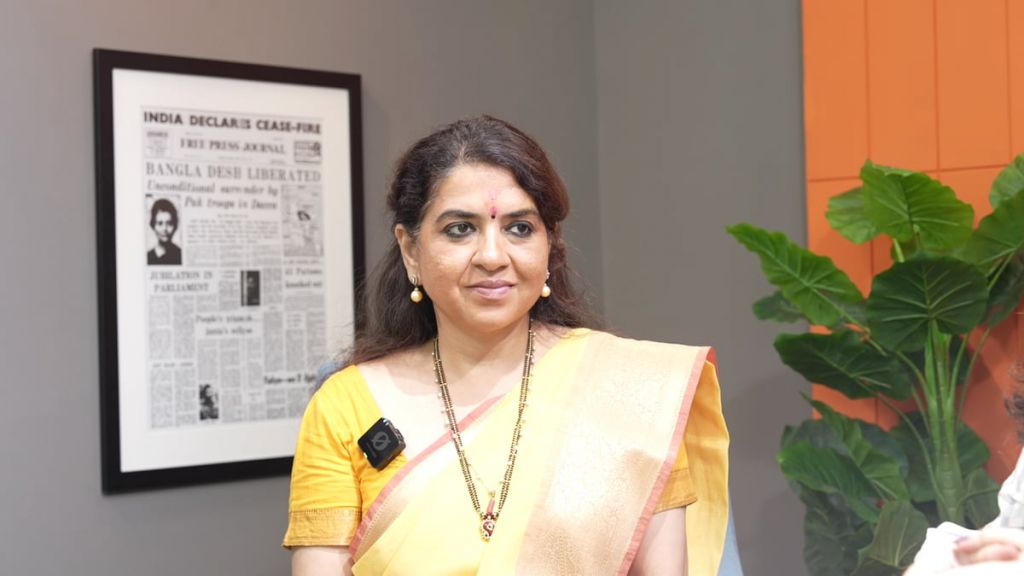
Shaina Nana Chudasama (51), more commonly known as Shaina NC, is a well-known fashion designer, social worker, and politician who had recently turned her attention to the assembly elections, contesting from Mumbadevi constituency in the heart of Mumbai. On Monday, she interacted with senior journalists at FPJ House and fielded a range of questions with alacrity.
Running against incumbent MLA Amin Patel (61) of the Congress, Shaina NC had centered her campaign on the need for extensive infrastructure improvements and civic services in a district she described as significantly neglected. Speaking candidly, she highlighted her commitment to transforming Mumbadevi, an area she described as severely neglected in terms of development and basic amenities.
Addressing her critics, Shaina NC said she was weary of defending her intentions and actions. “I filed the FIR against Arvind Sawant, Shiv Sena (UBT) MP, because it was the right thing to do. I did not do it to grab attention. The focus should be on my work,” she said, referring to recent controversy of being called ‘Imported Maal’. If such derogatory remarks against women were going to be made, FIRs would be registered, and the law would take its course.
Shaina NC’s critique of Mumbadevi’s infrastructure painted a stark picture. She described the living conditions in areas like Kamathipura as “packed like sarees in a cupboard” due to dense and congested housing. According to her, the area’s narrow lanes made it nearly impossible for emergency vehicles to respond effectively to emergencies. “When I visited the site of a fire, it was extremely difficult for fire engines to reach the spot. People were, in many ways, living at the mercy of luck,” she said. In her view, the lack of development was a result of political neglect, with elected representatives failing to ensure basic amenities such as sanitation, hygiene, and walking space.
She was skeptical about whether the current MLA had taken any meaningful steps to address any of these issues. “We’re not talking about luxury amenities—just the bare minimum that any citizen deserves,” she said, noting that proposals for redevelopment seemed absent. Shaina highlighted projects like the Parel BIT Chawl, one of Mumbai’s oldest housing clusters, which was undergoing redevelopment under the state’s oversight. She credited Chief Minister Eknath Shinde and Deputy Chief Minister Devendra Fadnavis for initiating change in areas like the Worli BDD Chawls adding, “The incumbent MLA’s so-called performance needs closer scrutiny. The SBUT project of the Saifee Burhani Upliftment Trust was the only successful initiative here so far. We need every corner of Mumbadevi to see real benefits. It’s a challenging constituency, but I’m confident that with the right approach, I will succeed. We need an accurate blueprint for this, and it must be executed holistically not piecemeal.”
A component of Shaina’s campaign was her stance on illegal construction, an issue she said had worsened under what she saw as a political-builder nexus. She argued that illegal high-rise buildings in B-Ward, sometimes up to 15 floors, indicated selective rule enforcement and a vote-bank strategy that served particular groups. “The politician-builder nexus is one of the worst aspects of our system, and I want nothing to do with it. I’m here for transparent, principled governance. I am nowhere near corruption. My focus is on working with the administration to bring real change, not filling the city with needless high-rises,” she asserted, adding that she wanted nothing to do with the alleged builder-politician alliances. She alleged that large scale illegal construction in the constituency could not have happened without the MLA's patronage.
For Shaina, Kamathipura and other areas within Mumbadevi deserved a comprehensive redevelopment plan on par with projects in Worli. She argued that progress could not happen without a holistic approach and clear blueprints, particularly for densely populated areas. Her concern extended beyond infrastructure, as she pointed to recent crimes in the constituency, such as the murder of a 34-year-old, arguing that the lack of accountability on these issues showed a need for proactive leadership.
Shaina was outspoken about the importance of religious and cultural inclusivity, emphasizing that she came from an interfaith family. Her mother was Bohra Muslim, her father a Hindu, and her husband a Jain. “Let me be clear, I am not anti-Muslim. I don’t want to play the votebank card. In this constituency, voters are being treated as votebanks only, and if you look at the illegal constructions, only people from particular groups are being allowed to go ahead with unauthorised structures,” she stated, explaining that her priority was civic health and safety for all residents, not targeting specific communities. “Civic awareness around health and education is key,” she added, supporting decisive action against sanitation violations.
Speaking about women in Mumbadevi, she pointed to the Ladki Bahin scheme, under which around 40,000 women of Mumbadevi had received financial support and this included 15,000 Muslim women. “People here are smart; they recognize who genuinely cares about their needs,” she noted.
When questioned about her roots in Mumbadevi and often being called an outsider by locals, she responded, “It’s absurd. I’ve spent much of my life in this area. My mother grew up in Nagpada and Madanpura, my grandmother lived here, and I’m the third generation of my family in South Mumbai. When someone like Aaditya Thackeray contests from Worli despite residing in Kalanagar, no one bats an eyelid. But somehow, my presence here is an issue?”